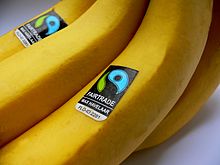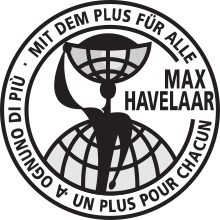Max Havelaar Foundation (Switzerland)
| Max Havelaar Foundation (Switzerland) | |
|---|---|
| legal form | Foundation, endowment |
| founding | 1992 |
| Seat | Zurich , Switzerland |
| management | Renato Isella |
| Website | www.maxhavelaar.ch |
The Max Havelaar Foundation (Switzerland) is a foundation based in Zurich . It awards its seal of approval to products that have been produced and traded in accordance with the international fair trade standards set by Fairtrade International .
portrait
The non-profit organization awards a well-known Fairtrade label in Switzerland. As a member of Fairtrade International , it does not trade. The main purpose of the foundation is to create market access for Fairtrade products as well as to provide information and awareness-raising for fair trade in Switzerland.
history
The foundation was established in 1992 by the Swiss aid organizations Bread for All , Caritas Switzerland , Fastenopfer , Heks , Helvetas and Swissaid in Basel . The Federal Office for Foreign Trade (now SECO) made an initial contribution. The foundation has been self-supporting since 2001.
Even then there was a fair trade organization in the Netherlands . The foundation was established in Switzerland based on their model.
The first Max Havelaar certified product came onto the market in 1992. It was coffee, the world market price of which had fallen rapidly in previous years, which drove many small farmers into poverty and ruin. In the course of the following years the foundation grew steadily and new products were gradually certified. After more than 20 years of activity by the foundation, more than 2,200 certified Fairtrade products are available in retail and catering. They include over 60 different coffee blends, bananas, plants, fruit juices, exotic fruits, textiles / cotton products, more than 15 types of honey, chocolate / cocoa products, pineapples, avocados, mango, rice, quinoa, tea, sugar, spices and dried fruits. In 2008, the organization for the European Football Championship in Switzerland also launched fairly produced sports balls. Since the end of 2014, small-scale miners from certified companies have also been able to sell their gold in Switzerland.
In 1997, the Fairtrade Labeling Organizations International was founded, partly with the help of the foundation.
From December 2006 to 2013, the STEP Foundation , whose aim is to certify hand-knotted carpets under fair conditions, belonged to the Max Havelaar Foundation.
In February 2008 the foundation changed its logo to the one used by various umbrella organizations across Europe, thereby helping to make fair trade products recognizable beyond national borders.
In order to reach even more consumers and thus be able to support even more producers in disadvantaged regions of the south, both sales channels, such as in the catering trade, as well as offerings are constantly being expanded and expanded. In 2014, 220 licensees, 850 catering partners and 25 goldsmiths committed themselves to fair trade. In 2015, the headquarters of the foundation were relocated to the Zurich office and the Basel office was closed.
Max Havelaar
"Max Havelaar" is the main character of a novel, published in 1860 under the title Max Havelaar or the coffee auctions of the Dutch trading company . Eduard Douwes Dekker wrote his partly autobiographical book under the pseudonym " Multatuli ". Dekker had lived in the East Asian colonies as an employee of the Dutch state since he was 18. He fought for a long time, but ultimately unsuccessfully, against the colonial grievances there and finally resigned.
The novel and its main character are very popular in the Netherlands . When quality seal organizations for fair trade were founded in various countries, it was obvious, also in Switzerland, for symbolic reasons to choose the name “Max Havelaar”.
purpose
The purpose of the foundation is to improve the living and working situation of producers and workers in economically disadvantaged regions in the south.
The core tasks include creating market access for Fairtrade products as well as information and awareness-raising work for “fair trade” in Switzerland.
Meaning of the seal of approval
The Max Havelaar seal of approval stands for fairly produced and traded products, including:
- stable minimum prices,
- the payment of a Fairtrade premium,
- long-term trade relationships,
- environmentally friendly cultivation; at least integrated production , increasingly also in organic quality.
financing
The foundation has been self-supporting since 2001. It is financed through income from license fees that the Foundation receives from its trading partners for awarding the seal of approval.
Sales of Max Havleaar-certified products in Swiss retail and gastronomy amounted to CHF 223.4 million in 2006. The partners with the highest sales remained unchanged, Coop and Migros , followed by claro fair trade, AG for fruit trade and Agrotropic (flower wholesale). Textiles and cotton wool products with the Max Havelaar seal of approval developed positively. Due to the expansion of the range and a. at Manor and Switcher sales rose by 73%. In the fruit juices sector, various new partners, including Cremo , Rauch and Rivella (Michel brand), were won as new licensees, which was reflected in increasing sales (+24%). The bananas felt the price pressure again and suffered a slight decline in sales of –5.8%.
In 2011, sales of licensed fair trade products in the Swiss retail trade rose to CHF 328.8 million (+ 8% compared to 2010).
In 2014, Swiss consumers spent 467 million francs on Fairtrade products (7.5% more than in the previous year). This corresponds to around 57 francs per person. The goal of the foundation is 100 francs per person per year. For 2017, the foundation found that Swiss consumers spent CHF 701 million on Fairtrade products. Per capita consumption rose to CHF 83. This corresponds to an increase of 33.4% compared to 2014, but the target has not yet been achieved.
International cooperation
In 1997 the foundation was a founding member of the international organization Fairtrade Labeling Organizations International (FLO), now called Fairtrade International, based in Bonn. As part of this network, the Max Havelaar Foundation works with 19 other nationally organized Fairtrade initiatives and three continental producer networks. The national Fairtrade initiatives and the continental producer networks are legally and financially independent of each other and appear under different names (e.g. Fairtrade Germany, Fairtrade Foundation UK, Fairtrade Africa).
Certified products
The following products with the Max Havelaar label are on the market:
- Pineapple since January 2003; Market share in the Swiss retail trade, 2014: 19%
- Avocado since April 2005; Market share in the Swiss retail trade, 2014: no information
- Bananas since March 1997; Market share in the Swiss retail trade, 2014: 53%
- Cotton products since April 2005; Market share in the Swiss retail trade, 2014: no information
- Flowers since April 2001; Market share in the Swiss retail trade, 2014: no information
- Spices since November 2009; Market share in the Swiss retail trade, 2014: no information
- Fruit juice since March 1999; Market share in the Swiss retail trade, 2014: 17%
- Gold since 2014;
- Honey since November 1993; Market share in the Swiss retail trade, 2014: 10%
- Coffee since March 1992; Market share in the Swiss retail trade, 2014: 10%
- Plants since March 2004; Market share in the Swiss retail trade, 2014: no information
- Rice , quinoa since March 2002; Market share in the Swiss retail trade, 2014: 11%
- Chocolate , cocoa since November 1994; Market share in the Swiss retail trade, 2014: 4%
- Tea since November 1995; Market share in the Swiss retail trade, 2014: 6%
- Dried fruits , nuts since 2002; Market share in the Swiss retail trade, 2014: no information
- Cane sugar since November 1994; Market share in the Swiss retail trade, 2014: 35%
See also
literature
- Multatuli ( Eduard Douwes Dekker ): Max Havelaar or the coffee auctions of the Dutch trading company . Ullstein Verlag, Berlin 1997, ISBN 3-548-24166-2 .
Web links
Individual evidence
- ↑ What we do. (No longer available online.) Label Step, archived from the original on March 4, 2016 ; Retrieved September 4, 2015 . Info: The archive link was inserted automatically and has not yet been checked. Please check the original and archive link according to the instructions and then remove this notice.
- ↑ PDF . Max Havelaar Foundation (Switzerland) Annual Report 2014. Accessed August 28, 2015.
- ↑ Archived copy ( Memento of the original from March 4, 2016 in the Internet Archive ) Info: The archive link was inserted automatically and has not yet been checked. Please check the original and archive link according to the instructions and then remove this notice. Strategic guidelines of the Max Havelaar Foundation (Switzerland). Retrieved August 28, 2015.
- ↑ PDF . Max Havelaar Foundation (Switzerland): Annual report 2014 . Retrieved August 28, 2015.
- ↑ PDF , Max Havelaar Foundation (Switzerland): Report of the auditors to the Board of Trustees on the 2017 annual financial statements . Retrieved June 7, 2018.
- ↑ Archived copy ( memento of the original from December 25, 2015 in the Internet Archive ) Info: The archive link was inserted automatically and has not yet been checked. Please check the original and archive link according to the instructions and then remove this notice. Website of the Max Havelaar Foundation, product overview. Retrieved December 25, 2015.
- ↑ [1] Max Havelaar Foundation (Switzerland) Annual Report 2014. Accessed on August 28, 2015 (PDF)
- ↑ Max Havelaar / Fair Trade Gold . Retrieved December 23, 2019


